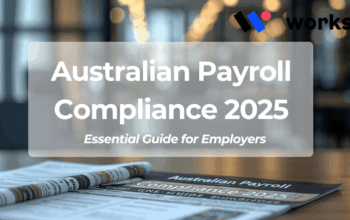Table of content
- What Are the Hours of Work Under the General Retail Industry Award?
- How to Roster for the General Retail Industry Award?
- What is Shiftwork under the General Retail Industry Award?
- What are the Entitlements?
- To Wrap Up
- How Does Workstem Help?
- FAQs: Rostering & Compliance Under the General Retail Industry Award [MA000004]
In Australia’s fast-paced retail landscape, effective rostering is not just about filling shifts, it’s about ensuring compliance and optimising business operations for everything to run smoothly. The General Retail Industry Award [MA000004] provides a comprehensive framework that governs how employers should schedule their workforce correctly according to Fair Work regulations. Understanding these provisions is crucial for any retail business aiming to stay compliant and efficient.
Before getting into the process of scheduling employees’ work shifts and hours, you must first understand the standard hours of work excluding overtime across different employment types.
What Are the Hours of Work Under the General Retail Industry Award?
Under the General Retail Industry Award, the different employee types are full-time, part-time, casuals, on-hire and apprentices or trainees. Employers must clearly understand the guidelines for ordinary hours in the retail industry as it is the foundation of compliant rostering.
Full-Time Employees
- Work 38 hours per week.
- An evaluation must be conducted in each establishment to determine the most suitable way to arrange these hours (e.g., over one, two, three, or four weeks).
- Either party can initiate this evaluation, but it can only happen once per year.
Part-Time Employees
- Work under 38 hours per week on a regular schedule.
- Minimum engagement: 3 hours per shift.
Employers can adjust regular patterns with 7 days’ written notice (or 48 hours in emergencies), but patterns can’t fluctuate weekly to avoid award entitlements.
Casual Employees
- Work up to 38 hours per week, with no guarantee of ongoing work.
- Minimum daily engagement: 3 hours.
- Exception: 1.5 hours if the employee is a secondary school student, working between 3:00 PM and 6:30 PM, with parental consent and where longer shifts aren’t feasible.
On-Hire Workers
- Hours and conditions should mirror those of directly employed staff in comparable roles.
- Governed by contracts with the labour hire agency, but must remain compliant with the Award.
Apprentices/Trainees
- Hours align with full-time or part-time arrangements, depending on the training agreement.
- Rostering must consider training requirements and workplace capability.
How to Roster for the General Retail Industry Award?
Full-Time
Under the General Retail Industry Award, full-time employees must average 38 hours per week. This can be arranged flexibly:
- 38 hours per week,
- 76 hours over two consecutive weeks,
- 114 hours over three weeks,
- 152 hours over four weeks,
- Or averaged over a longer agreed period.
This flexibility allows employers to adapt to seasonal changes while staying compliant.
Part-Time
Rostering for part-time employees comes with its own set of rules:
- Employers can alter a part-time employee’s regular pattern of work with 7 days’ written notice (or 48 hours in an emergency).
- However, to avoid award breaches, the pattern can’t change week-to-week or fortnight-to-fortnight.
- If it does, employees must be compensated based on the original pattern as if no changes had occurred.
This protects employees from unpredictable scheduling and ensures award entitlements are preserved.
Breaks Must Be Rostered
Meal and rest breaks must be properly scheduled and displayed on the roster to comply with the Award. Here’s what you need to know:
- Unpaid Meal Breaks
-
-
- A meal break of 30 to 60 minutes must be taken no later than five hours after starting or resuming work.
- Meal breaks don’t count as time worked.
- Meal breaks cannot be scheduled within the first or last hour of a shift.
-
- Paid Rest Breaks
-
-
- Entitlements are based on hours worked per shift:
- 4–5 hours: One 10-minute paid rest break
- More than 5 but less than 7 hours: One 10-minute paid rest break (plus unpaid meal break)
- 7–10 hours: Two 10-minute paid rest breaks—one in each half of the shift (plus unpaid meal break)
- 10+ hours: Two 10-minute paid rest breaks (plus unpaid meal break)
- Additional notes:
- Rest breaks count as time worked.
- Breaks must be meaningfully placed to give relief—not in the first or last hour of work.
- No paid rest break for shifts under 4 hours.
- Entitlements are based on hours worked per shift:
-
- Combined Breaks Not Allowed
-
- Rest breaks cannot be combined with unpaid meal breaks.
- Employers must schedule each break separately to comply.
- Rest Between Work Periods
-
- Employees must receive a minimum of 12 hours between finishing and starting work again.
- If this 12-hour break isn’t provided, the employee must be paid at 200% of the minimum hourly rate until the break occurs.
- No loss of pay is allowed for missed ordinary hours due to this requirement.
- The break can be reduced to 10 hours by mutual agreement between the employer and employee(s).
Roster Notice Periods
Interestingly, the Retail Award doesn’t specify how far in advance rosters must be posted. However:
- Permanent changes require 7 days’ written notice.
- If an employee disagrees, this can extend to 14 days.
- Emergency or short-notice changes must be agreed upon mutually.
- Disputes about roster changes can be resolved via the award’s dispute resolution clause.
Transparent communication here is key to maintaining trust and compliance.
Roster Flexibility and Variation
The General Retail Industry Award supports flexibility where needed. Employers and employees can mutually agree to vary certain terms relating to hours of work. This helps businesses manage operational demands while accommodating individual needs.
Flexible Work Requests
Employees have a legal right to request flexible work under the National Employment Standards (NES), particularly for family, study, or health reasons. Employers must respond thoughtfully and can only reject requests on reasonable business grounds.
Rostered Days Off (RDOs)
Managing rostering for RDOs requires attention to several rules:
- No more than 5 days of ordinary hours per week unless offset in the following week.
- Two consecutive days off per week—or three in a two-week cycle—must be scheduled unless otherwise agreed.
- Employees working regular Sundays must have three consecutive days off (including Saturday and Sunday) per four-week cycle.
These rules are designed to ensure fair work/life balance and to reduce burnout from your team.
Substituting RDOs
In certain circumstances—such as emergencies, machinery breakdowns, or unusual demand—employers can substitute a rostered day off with another day. This must be agreed upon by the majority of affected staff.
Additionally, employees and employers can agree to save up to five RDOs per year, to be taken at a mutually convenient time.
Roster Period Limits
A rostering cycle can’t exceed four weeks—unless there’s a specific agreement in place. Rosters must be:
- Clearly displayed (e.g., on a noticeboard), or
- Made electronically accessible to all staff.
Maintaining an accurate, visible roster is a simple way to prevent disputes and ensure transparency.
What is Shiftwork under the General Retail Industry Award?
Shiftwork refers to working hours outside the standard daytime span, typically including early mornings, nights, and rotating shifts. It ensures businesses can operate beyond regular hours and must comply with specific rules under the General Retail Industry Award. Shiftwork applies in these scenarios:
- General retail employee (excluding baking production):
Shift starts at or after 6:00 PM and before 5:00 AM the following day.
- Baking production employee:
Shift starts at or after midnight and before 6:00 AM.
All hours worked during a shift are regarded as continuous under the Award.
What are the Entitlements?
-
Ordinary Hours
Same as day workers: up to 38 hours/week averaged over a cycle. Only difference is the span of hours during which those hours are worked.
-
Breaks
Same entitlements as day workers, but all breaks are paid and count as time worked.
-
Rest Between Shifts
Minimum 12-hour break (or 10 by agreement), same as day workers.
To Wrap Up
Getting rostering right is critical for avoiding compliance breaches, costly back pay, and Fair Work penalties. With the complex rules under the General Retail Industry Award, covering breaks, shiftwork, ordinary hours, and roster changes, it’s essential to have an accurate scheduling process.
Workstem’s all-in-one platform makes it easy for retail businesses to manage rosters, track working hours, and ensure employees get the breaks and entitlements they’re owed. By automating compliance with award conditions, you reduce risk, protect your business, and keep your workforce engaged and fairly treated, every shift.
How Does Workstem Help?
Simplify your payroll process and ensure accurate pay rates with Workstem’s automated payroll system. Our pre-built modern award interpretation software covers 122+ awards and 34 EBAs, and keeps you up-to-date with penalty rates and other award entitlements.
Choose between our Standard and Advanced plans, and enjoy a range of benefits such as Fair Work compliance, an employee self-service App, and custom rule set. We have integrated our system with Xero and NetSuite as well to bring you a complete HR SaaS solution for your business.
Book a free demo with our payroll experts. Experience the efficiency and accuracy of Workstem today!
FAQs: Rostering & Compliance Under the General Retail Industry Award [MA000004]
1. What is the minimum engagement for part-time and casual retail employees?
Part-time employees must be rostered for at least 3 hours per shift. Casuals also have a 3-hour minimum, except secondary school students who may work 1.5 hours under specific conditions.
2. How much rest time is required between shifts under the Retail Award?
Employees must receive a minimum of 12 hours between shifts (can be reduced to 10 hours by agreement). If not, they must be paid double time until the break is provided.
3. Can I change an employee’s roster at short notice?
Roster changes require 7 days’ written notice or 48 hours in emergencies. If the employee disagrees, the notice period may extend to 14 days.
4. Are rest and meal breaks mandatory in retail rostering?
Yes. Breaks must be scheduled and displayed on the roster. Rest breaks are paid, while meal breaks are unpaid. These cannot be combined.
5. What are the ordinary hours of work for full-time retail employees?
Full-time employees must average 38 hours per week, which can be arranged over 1 to 4 weeks, or longer by agreement.
6. What qualifies as shiftwork under the General Retail Industry Award?
For most retail workers, any shift starting at or after 6:00 PM and before 5:00 AM counts as shiftwork. Special rules apply for baking employees.
7. How does Workstem help with award compliance in rostering?
Workstem automates award interpretation, including rostering rules, breaks, and pay conditions—ensuring compliance, accurate payroll, and employee satisfaction.
Read more:
General Retail Industry Award Guide [MA000004]
Updated Retail Award Rates 2024: What You Need to Know
Case Study 1: Revealing the Difference Between Woolworths’ EBA and Retail Award
Enhanced Retail Scheduling: Rostering System for Australia
Managing Retail Payroll: Best Practices and Guidelines





![Rostering for General Retail Industry Award [MA000004]](https://www.workstem.com/au/wp-content/uploads/sites/7/2025/06/Add-a-heading-1-min.png)


